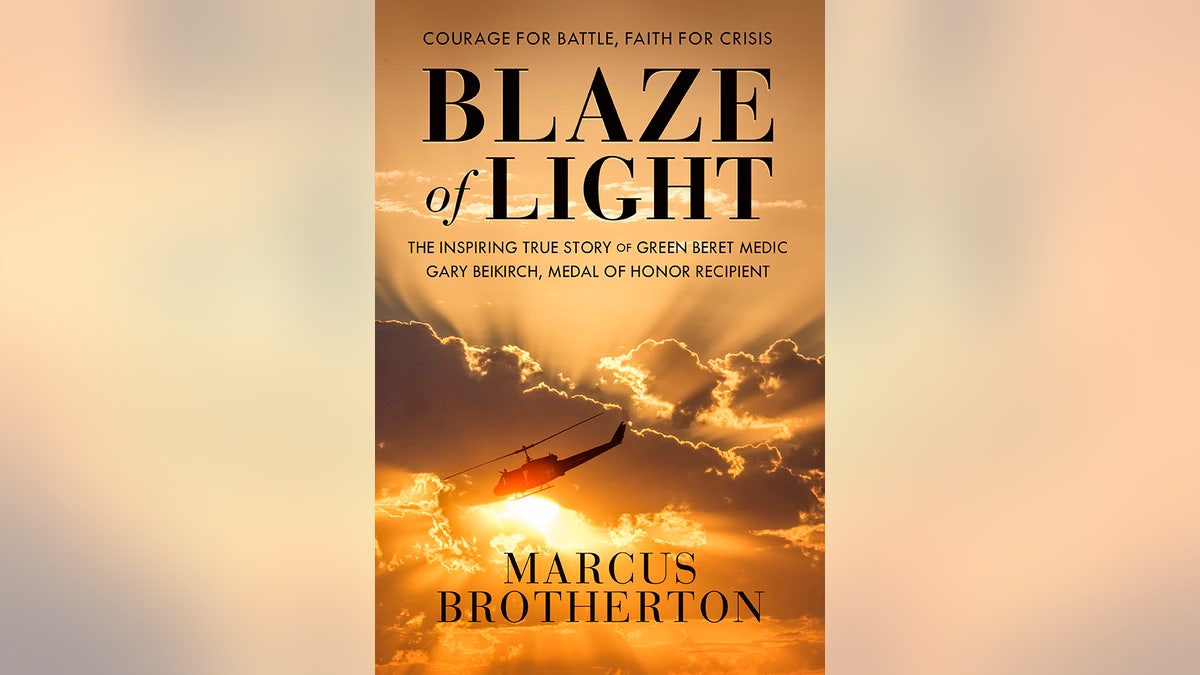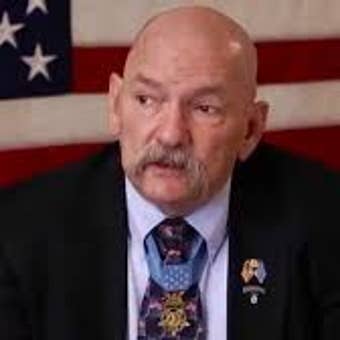Medal of Honor recipient Gary Beikirch.
Gary Beikirch, author of 'Blaze of Light,' shares his message of love and sacrifice..
The coronavirus pandemic has made this a difficult year for millions of people around the world, including my wife and me. Yet we’ve chosen to focus on a simple but deep lesson of hope that I first learned as an Army Green Beret medic in the jungles of Vietnam, where I was severely wounded. It’s a lesson that can help everyone.
I was part of a team of Green Berets sent to the village of Dak Seang in 1969, where I served as the chief medic for some 400 Montagnard soldiers and 2,300 women and children. The Montagnards are a tribal people who lived in the Central Highlands of South Vietnam and were allied with South Vietnamese and U.S. forces against North Vietnam and the Viet Cong.
The enemy had vowed to wipe the village of Dak Seang off the face of the Earth, so the residents welcomed us warmly and appreciated the training we provided.
MEDAL OF HONOR RECIPIENT GARY BEIKIRCH: CORONAVIRUS SPURRING AMERICANS TO TRULY LIVE FOR OTHERS
A Montagnard boy named Deo, however, ended up training me. Deo was only 15, yet already a skilled hunter and warrior in his village. We quickly became friends. I asked him to show me how to survive in the jungle — a place I saw as fearful.
"Survive?" Deo said with a laugh. "I won’t teach you merely to survive. The jungle is full of opportunity. The jungle provides many things we need to live."
More from Opinion
One humid morning as Deo and I walked along a trail, he pointed to a clump of foliage and asked me what I saw. I was afraid of snakes, so I tended to see snakes everywhere. But Deo reached straight into the foliage, dug around, and pulled out a bundle of roots. "Good to eat," he said.
Right then, I began to understand the lesson Deo was teaching me: in life, what you see is what you get. Where I saw fear, he saw opportunity. Where I saw difficulty, he saw abundance.
In my last days in that faraway country, I was severely wounded when Dak Seang was besieged and overrun by 10,000 enemy soldiers. I was shot in the stomach, hip, and back, and paralyzed from the waist down. Yet I knew I still had a job to do.
In the midst of the siege, with enemy bombs exploding throughout the camp, I called Deo and another helper to my side. They understood that many in our midst urgently needed medical attention. So they half-carried, half-dragged me around the village from one wounded person to the next. This way I continued to administer aid to the villagers and indigenous fighters.
An enemy rocket came whistling in. Deo set me down instantly and flung his body on top of mine. The rocket exploded near us. I opened my eyes, but Deo didn’t. He was the true hero that day.
In one horrifying moment, an enemy rocket came whistling in. Deo set me down instantly and flung his body on top of mine. The rocket exploded near us. I opened my eyes, but Deo didn’t. He was the true hero that day.
What did Deo see in the seconds before he died? I’m sure he saw the huge trouble we were all in. He saw the bullets and bombs. But deep within, he had already committed himself to extreme selflessness.

"Blaze of Light," the biography of Gary Beikirch.
Rather than fear, Deo saw our close friendship, and he saw my need. In those few desperate moments, we shared the greater love that occurs whenever a person lays down his life so another can live. The greater love I saw in Deo was exactly what I received.
After I came home to the U.S., I spent more than a year in hospitals and regained the use of my legs. I returned to college, but like so many of my generation of military personnel during that troubled era I was harassed for being a veteran. I was called names, shoved and spit upon.
The pressure intensified. I resisted society and grew my hair long. While hiking in the northern Appalachians, I felt the wilderness soothe my weary spirit. So I decided to drop out of conventional culture. For over 18 months I lived in a cave in the White Mountains of New Hampshire. The cave became my refuge, my shelter in the storm.
I learned Deo’s lesson a final time one afternoon on a hike. I wanted to climb to the summit of Mount Adams, but the way forward was slippery and strewn with boulders. The climb proved difficult and wearying and I found myself frustrated by the obstacles in my path.
CLICK HERE TO SIGN UP FOR OUR OPINION NEWSLETTER
Only when I reached the summit did I look back and see that the boulders had actually helped my climb. They provided footholds and handholds on the slippery slope. What I initially had seen as hindrances had actually acted as rungs on a ladder, helping me get where I wanted to go.
Today, as my wife and I sit by our fireplace in our home near Rochester, N.Y., we consider how this past year has been filled with many obstacles for many people. In addition to the pandemic, social upheaval, and missed opportunities that have rocked our nation and the globe, my wife and I are personally grappling with my recent diagnosis of pancreatic cancer.
We don’t know what the future holds, yet we have decided to fix our eyes on something greater than our uncertainties and fears. A greater love is available. It may come through friends, family, or neighbors. It’s always available through God.
CLICK HERE TO GET THE FOX NEWS APP
As a chaplain, I’m convinced that God allows obstacles into our paths to help us in our progress, to shape us into all we can be. Fear and frustration can cause us to narrow our focus. If our focus is only on the trouble, we will miss opportunities and benefit.
Yet if we allow ourselves to fix our eyes on the greater love, we’ll see footholds and handholds, helping us reach the summit.










































